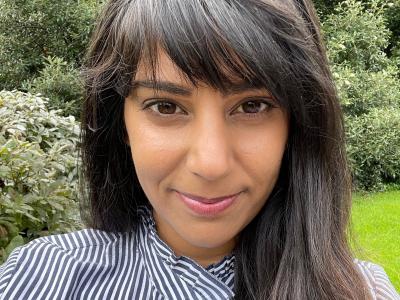
Dr Alycia Pirmohamed is the 2021-22 Junior Anniversary Fellow, working on her project Radical landscape poetry by racialised women and non-binary writers in the UK.
I have long grappled with the question of landscape and nature writing: who gets to call themselves a nature poet? Whose bodies have a perceived access to natural spaces?
In his recent essay, ‘Reclaiming Time,’ Jason Allen-Paisant argues “the possibilities of landscape are underpinned by socio-economic dynamics rooted in a colonial history and its afterlives.” My IASH project, ‘Radical landscape poetry by racialised women and non-binary writers in the UK’ investigates how place, body, history, and the page interact for writers of colour with a history of migration. Foregrounding inter- and trans-generational memory and experience, this project approaches landscape poetry from a postcolonial ecological perspective, simultaneously considering landscape poetry alongside the history of empire.
This research explores thematic and formal innovations of the Romantic tradition of landscape poetry by writers of colour across two strands: a critical research strand and an interdisciplinary, arts-based impact strand.
In partnership with the Scottish BAME Writers Network, and in my capacity as Junior Anniversary Fellow at IASH, I will offer four online workshops, themed around radical landscape poetry, to racialised women and non-binary writers based in Scotland. Taking place in early 2022, these workshops will explore how racialised bodies exist in relation to Scottish landscapes, and how these landscapes evoke history, memory, and cultural or inter-/trans-generational knowledge. They will be co-facilitated by academics and writers working within the environmental sciences to ensure a strong knowledge exchange component. The first workshop in this series will be co-facilitated by Vahni Anthony Ezekiel Capildeo, author of Like a Tree, Walking. And, in collaboration with Dr Shari Sabeti, I will undertake ethnographic research to explore how these workshops contribute to a sense of belonging and identity formation.
Overall, this work contributes to decolonising the literary arts in the UK, primarily by supporting the development of, and creating the space for, landscape poetry by women and non-binary writers of colour.
Elegy with Two Elk and A Compass
In Jasper, Alberta, I pass through the widowed poplars.
Evening hikes up its dark hems, trees begin howling their elegies,
when loosened from the thicket, two elk walk into my gaze.
Here, in the gap between needle point and destination,
there is an unkind earth that persists even as loss petals down
leaving the poplars bare. Earlier that day, I had crossed
the forest’s bridges and stepped beyond its corridors.
I had longed to find the hidden trail that led to the valley of roses.
From the elk, I am expecting a lesson, as if Allah has approached me
in the shape of a compass built from antler and vine.
Their muscles tense. One rises into a gallop, widening the field.
Its legs seize with strength and I remain in the space left behind:
the sudden nakedness of a northern forest. I am unable to follow—
The elk, in their way, have mastered living by mastering letting go.
Soon it will rain, and we will all wear our haloes of mist.
Click here to buy Second Memory, a collaborative pamphlet written by Pratyusha and Alycia Pirmohamed.
On International Women's Day, Alycia and novelist Mara Menzies gave readings of their work reflecting on the climate emergency and our shared histories, as part of Keep Scotland Beautiful's Climate Festival. The conversation was moderated by Dr Bashabi Fraser CBE. The Festival celebrated Scotland’s Year of Stories 2022 and took inspiration from the theme ‘Inspired by Nature’. A subtitled recording of the event is below.
